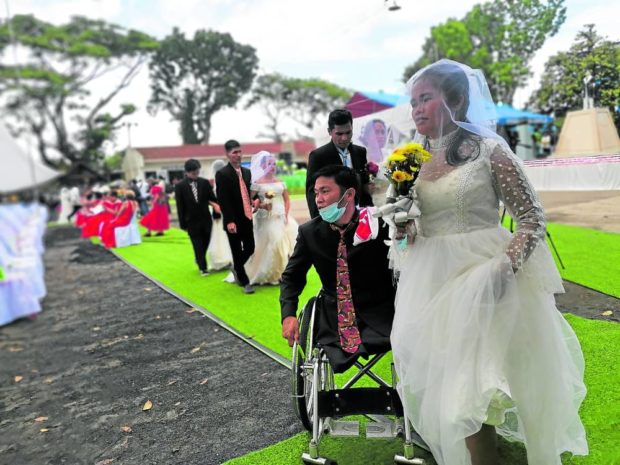
WAY TO ‘I DO’ | Wheelchair-bound Erlan Espinosa marries his partner of 12 years, Mary Ann Pobadora, during the town-sponsored mass wedding in Lala, Lanao del Norte, on Sunday, March 20, 2022. (DIVINA M. SUSON /Inquirer Mindanao)
LALA, Lanao del Norte, Philippines — For the first time since the coronavirus disease pandemic broke out, the municipal grounds here turned festive when a total of 1,261 couples showed up to say, “I do,” in a mass wedding organized by the municipal government and its partner, Everca Foundation, on Sunday.
Coming from the town’s 27 villages, some of the couples arrived at the Lala municipal building’s grounds as early as 4 a.m. The brides came donning white bridal gowns and the grooms in coats and ties, thanks to the local government, which shouldered the cost of their wedding attire aside from processing their marriage licenses.
Mayor Angel Yap, who officiated the union, said the mass wedding—locally dubbed as the Kasalan ng Bayan—came weeks after the Inter-Agency Task Force on the Management of Emerging Infectious Diseases lowered the province’s risk status to alert level 1, and almost three months since the turn of the year when the town consistently posted zero COVID-19 cases.
The mass wedding highlights the town’s 73rd founding year, observed on March 22, Yap said.
He said the town wanted to help legalize the marriage of couples already living together for years.
Economic woes
“Making your marriage legal is also a gift to your children,” Yap said in his message.
Among the couples who took part in the ceremony was Erlan Espinosa, who arrived at the venue in a wheelchair to wed Mary Ann Pobadora, his common-law wife for the last 12 years.
Espinosa, a fisherman in Barangay Pacita, said the wedding they earlier planned in their relationship did not push through because their income was not enough to shoulder the expenses.
“My income was just enough to buy our food and other needs,” said Espinosa, a person with a disability. The couple have three children ages 8, 5 and 3.
Roger Francisco, 62, who in the last 14 years has been living with his common-law wife Jovy Amador, 53, also cited the same reason.
Francisco said his income as a “trisikad” (passenger tricycle) driver had always been a challenge and had prevented them from getting wed.
“After the wedding, I will immediately resume driving my trisikad because we need money to buy rice. We will no longer celebrate,” Francisco said.
Both couples only had one reason to take part in the mass wedding: to legalize their union.
Vice Mayor Cesar Yap Jr. said he appreciated the couples’ interest to be legally married.
RELATED STORIES
Taguig couples tie knot in socially-distanced mass wedding
Mass wedding, 22-year-old practice, continues in Pagadian City amid pandemic
At Bacolod mass wedding, fear of COVID-19 adds accessory to attires—facial masks